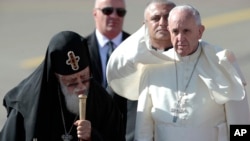Pope Francis arrived Friday in Georgia for a weekend of religiously symbolic meetings with Catholics, Orthodox, Muslims and Jews. But geopolitical concerns, including the bloodshed in Syria and the lingering effects of Georgia's 2008 war with Russia, might overshadow the trip.
Francis was greeted in the capital, Tbilisi, by Georgian President Giorgi Margvelashvili, the leader of the Georgian Orthodox Church, Patriarch Ilia, and hundreds of well-wishers waving Vatican flags. He then headed into a private meeting with Margvelashvili at the presidential palace.
Later in the day, he will issue an appeal for peace in Syria and Iraq, where Christians are being attacked and driven from their homes by Islamic extremists and where Francis has strongly condemned the recent assault by Russian and Syrian forces on the northern Syrian city of Aleppo.
A special prayer for peace is planned Friday evening in the Chaldean Catholic church in Tbilisi with members of the Assyrian Chaldean church leadership. It comes just days after Francis warned those responsible for the Aleppo siege “will be held accountable before God.”
On the eve of his visit, he met with aid groups working in Syria and urged all governments involved to “renounce their own interests in order to achieve the greater good: peace.”
It's unclear how far Francis will take his condemnation given his reluctance to offend Russia or the Russian Orthodox Church, after his historic meeting with the Russian patriarch in Cuba earlier this year.
That reluctance might also temper any direct criticism of what Georgia hopes to draw attention to during his trip: what it calls the “occupation” of South Ossetia and Abkhazia by Russia.
South Ossetia and Abkhazia broke away from Georgia in the early 1990s. Russia effectively gained complete control over both regions after a brief war against Georgia in 2008.
The Vatican says the pope's main message will be one of peace and reconciliation. The pope was expected to raise the plight of the more than 200,000 people displaced by the 2008 war, given his longtime concern for migrants, refugees and others forced to leave their homes.
A more subtle message of the trip is one of steadily improving ties between the Holy See and the two former Soviet republics.
When St. John Paul II visited Georgia in 1999 to mark the 10th anniversary of the fall of the Berlin Wall, Catholic-Orthodox tensions were so high that the Georgian Orthodox Church urged its faithful to stay away from his Mass. Relations are still strained, unlike the Vatican's more friendly relations with other Orthodox churches.
But the Vatican says an official delegation from the Orthodox patriarchate will attend Francis' Saturday morning Mass, a not-insignificant ecumenical development.
“For Georgia's Catholics and personally for me, the papal visit is a great event,” said Tako Peikrishvili, a 27-year-old from the village of Aral in southern Georgia's mountains.
The papal visit has triggered controversy, with some Georgian priests condemning the visit as an attempt to turn their flock into Catholics.
A small group of Orthodox activists protested on the road outside the airport on Friday. Some of them were holding placards in Georgian and English saying “Vatican is the spiritual aggressor” and “Pope arch-heretic, you are not welcome in Orthodox Georgia.” Earlier this month, the ultra-conservative Union of Orthodox Parents picketed in front of the Vatican embassy in Tbilisi, urging on Ilia not to meet with Francis.
The Georgian Church defended its decision to host the pope.
“We would like to stress that we view as unacceptable the negative statements made in public by some men of the cloth of the Georgian Orthodox Church regarding this official visit, and we urge them and everyone to be calm,” the Georgian Orthodox Church said in a statement. “The Pope is definitely conducting the Mass for Catholics, and we cannot consider this an act of proselytism as some think.”
Francis on Sunday travels to Azerbaijan for the second leg of the trip, spending only 10 hours on the ground, however.
Russia, Syria Geopolitics Frame Pope's Caucasus Trip

TBILISI —



